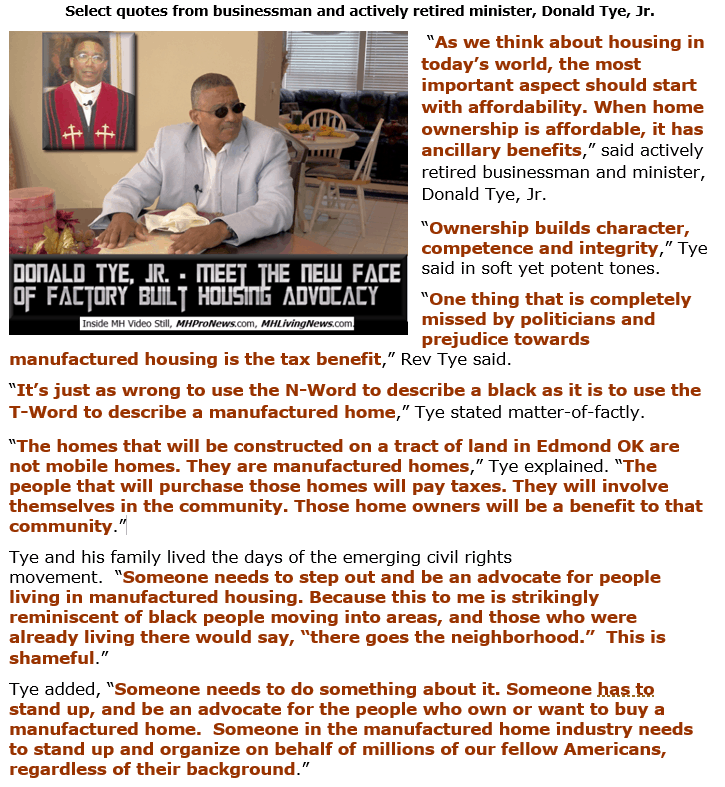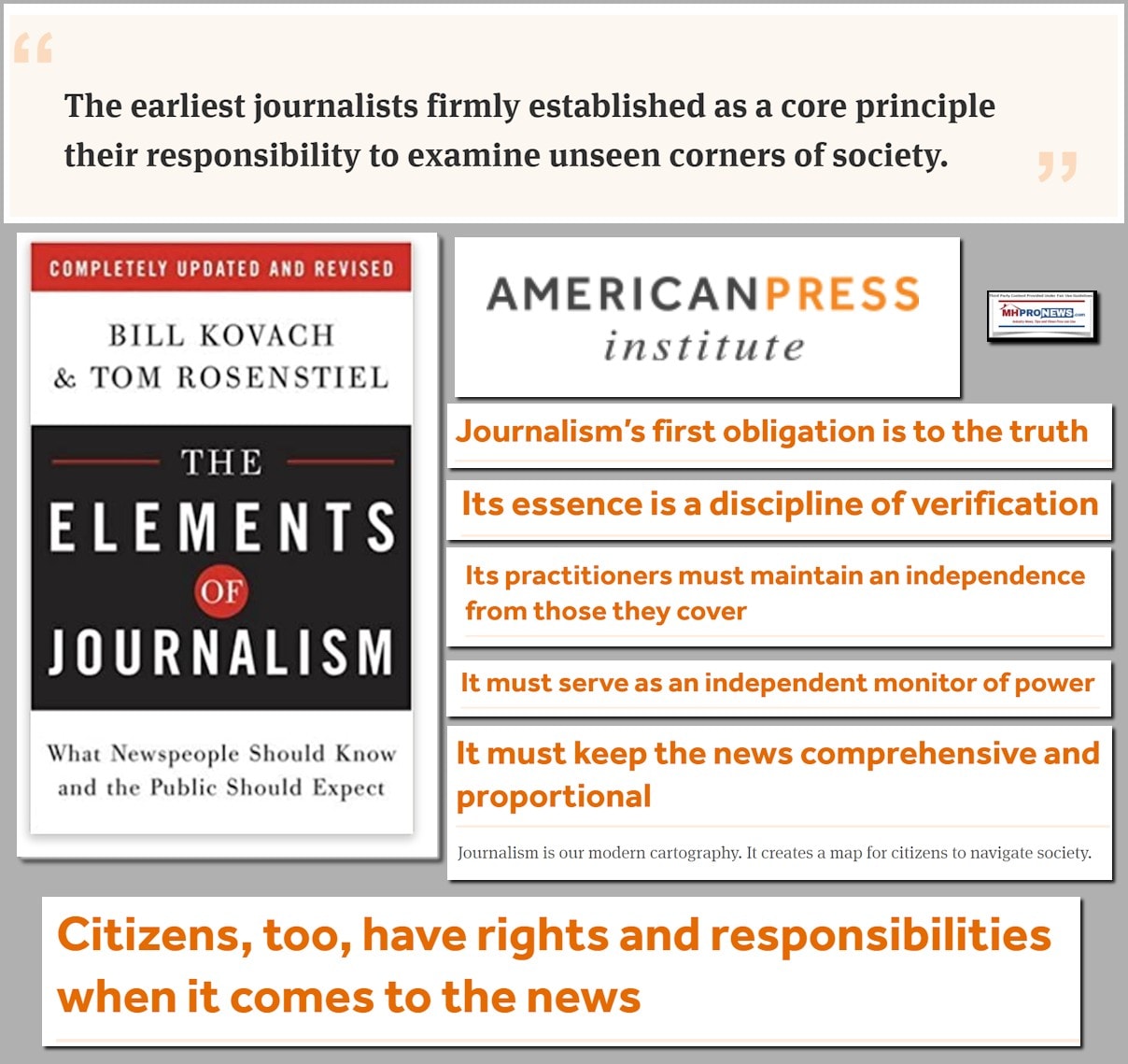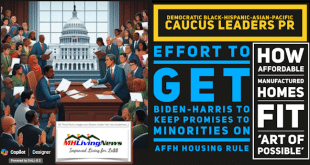Words may sound good but are at times proven to be devoid of meaningfully matching action. A new HUD PD&R report effectively confirmed and amplified several findings in an August 2021 research report and analysis on MHLivingNews entitled “Why So Few Affordable U.S. Homes? Federal & Other Research – Monopolies, Moats, Manufactured Housing – Impacts Renters, Current Manufactured Homeowners, Conventional Homeowners, Most Americans. Per HUD PD&R co-authors Pamela “Pam” Blumenthal and Regina Gray on September 7, 2021 – “Federally sponsored commissions, task forces, and councils under both Democratic and Republican administrations have examined the effects of land use regulations on affordable housing for more than 50 years.” HUD says that “The U.S. Department of Housing and Urban Development’s (HUD’s) Office of Policy Development and Research (PD&R) supports the Department’s efforts to help create cohesive, economically healthy communities.” So, the HUD PD&R researchers tasked with keeping HUD’s own mission on track have politely – but clearly – effectively condemned decades of demonstrably failed outcomes from numerous federal agency and federal leaders from both major parties. It is fair to say that HUD has been talking a good talk, but is failing to walk the walk associated with all the talk. In that context, Tyrone and Jaime Taft from Ayden, N.C. and the “Plant-A-Home” program could make affordable manufactured and factory-built homes available to more Americans. But they have been denied that by local officials, even though their is push-back and ongoing advocacy for the Taft’s and others by Mayor Pro-Tem Ivory Mewborn. When HUD was asked to use their legal authority to intervene, they have so far declined action. Additionally, the Manufactured Housing Institute (MHI), which claims to desire more manufactured home placements in precisely such settings as the Taft’s and Plant-A-Home seeks, have also failed to weigh in. The facts from HUD, related local media reports, emails and more shown below effectively speak to de facto racial and economic bias, dereliction of duty, and apparent violations of several federal laws. These will be all be systematically examined.
To frame the issues as to how this impacts millions of Americans, initial paragraphs from Blumenthal’s and Gray’s PD&R sum up why these facts directly impact tens of millions of Americans who want, need, and desire more affordable housing and authentic affordable home ownership.

In order to systematically and objectively cover the elements in this situation, this fact- and evidence-based report will provide the following segments.
- Several references from HUD’s PD&R Sept 7, 2021 findings. While only some specific related references are shown below, the entire text that the paragraphs below were drawn from, including additional linked information, are found at this link here.
- Electronic contacts with HUD, Ayden, corporate, local media, and Manufactured Housing Institute (MHI) officials on behalf of the interests of Tyrone and Jaime Taft and the “Plant-A-Home” program are documented in those messages shown.
- Additional Information, MHLivingNews Analysis and Commentary.
- Closing Thoughts and Possible Next Steps for Plant A Home and Similar Projects are provided. Because without real change, the status quo will only continue as it has for decades, per HUD’s own admissions.

Per HUD’s office of PD&R team members Blumenthal and Gray, the following frankly disturbing admissions and statements. The three graphics shown above and below are all from their report.


Although home production has recently been on the rise, building permits, one indicator of new housing supply, remain below historical averages and far below the level needed to eliminate the deficit in housing.
The consequences of inadequate supply are higher housing costs for both renting and buying a home. More than 37 million renter and owner households spent more than 30 percent of their income for housing in 2019. In the years prior to the pandemic, low interest rates for mortgage loans and increasing incomes, not lower home values, had reduced owner cost burden. For renters, increasing incomes were matched by rising rents, maintaining cost burdens despite a strong economy.”

All of that is useful information from HUD’s PD&R that illustrates once more that time and again, directly and/or indirectly, this new research report points its finger at federal, state, and local officials failing to do the job of actually making more affordable housing available.
That noted, one of several things missing from this report are these words: manufactured homes and manufactured housing.
That’s odd at best, troubling at worst. After all, Congress made HUD the primary federal regulator of manufactured housing in legislation that took effect on June 15, 1976. Fast forward to the Manufactured Housing Improvement Act of 2000 (MHIA). The widely bipartisan MHIA strengthened federal preemption over local zoning issues, which is why some refer to that stronger preemption language over zoning and placement as “enhanced preemption.”
None of that is in Blumenthal and Gray HUD PD&R. Why not? While they state and imply that many types of different housing solutions are needed and useful, they do not specifically mention HUD Code manufactured homes?
Yet, those HUD co-authors noted as a possible solution to some of the problems affordable housing seekers face the examples of California and Washington states. “California and Washington have preempted local prohibitions on accessory dwelling units. Other jurisdictions are adopting regulations to allow duplexes, triplexes, and quadplexes to be built through by-right zoning.”
That preemption over local zoning barriers is precisely a key feature of what the MHIA is supposed to do. That will be detailed further below. Note that there are a few examples of HUD actually exercising its preemption authority over local jurisdictions. That noted, it is not done routinely. As a result, is it any surprise that HUD is now reporting fewer affordable homes available today than in 2000? That’s a fact that MHLivingNews and MHProNews have previously reported.
Some additional pull quotes from Blumenthal and Gray are below.

The regulatory environment — federal, state, and local — that contributes to the extensive mismatch between supply and need has worsened over time. Federally sponsored commissions, task forces, and councils under both Democratic and Republican administrations have examined the effects of land use regulations on affordable housing for more than 50 years. Numerous studies find land use regulations that limit the number of new units that can be built or impose significant costs on development through fees and long approval processes drive up housing costs. Research indicates higher housing costs also drive up program costs for federal assistance, reducing the funds available to serve additional households.” …
Having several years of experience with holding certain federal, local, corporate, and nonprofit officials accountable in matters that pertain to affordable housing and manufactured homes, MHLivingNews/MHProNews has learned the value of documenting the outreach via email and/or via text. Among other advantages, this eliminates a possible ‘he said, she said’ style dodge on the part of those who want to avoid responsibility for either action and/or inaction.
Three different sets of messages are provided below, some of which involves relevant overlap. A similar message to the one sent to Ayden city leaders was sent to Tyrone and Jaime Taft.
Thus far, the Taft’s, Ayden Mayor Pro-Tem Ivory Mewborn, Mark Weiss, J.D., President and CEO of the Manufactured Housing Association for Regulatory Reform (MHARR), and Reflector reporter Donna Williams have responded.
- The Taft’s, while frustrated and disappointed with the process so far, still want their own home.
- Mewborn says he is thankful for our bringing attention to these legal issues that could benefit the Taft’s and other “Plant-A-Home” seekers. Mewborn has indicated he has follow up activities planned to continue to pursue the needs of the Taft’s and others. Mewborn, a civic- and community-minded person of faith, said that MHLivingNews’ information to city officials and others on this topic of potentially useful federal laws to overcome zoning discrimination were “an answer to prayer,” and a “God send” for the hopes of those who want to see the Plant-A-Home program move toward realization in Ayden and beyond.
- Williams at the local news publication, the Reflector, said that neither the Manufactured Housing Institute (MHI) nor the North Carolina Manufactured and Modular Housing Association (NC-MHA.org) contacted her before or after her reports on these issues.
- That last point from Williams about MHI et al not weighing in is significant. Because it is one more example of MHI connected officials failing to do what their job description and stated mission says they will do.
More on each of these will be presented herein.
This occurs in the backdrop of Biden Administration rhetoric that is pledging more for affordable housing. But as HUD’s PD&R staffers Blumenthal and Gray stated, such talk spans 50 years. That includes the President Barack Obama, Vice President (VP) Joseph “Joe” Biden 8 years in office.
Additionally, HUD Secretary Marcia Fudge has said in multiple written and video-recorded statements that she is supportive of the use of more manufactured homes. But when the Fudge led HUD has issued statements on affordable housing, the Manufactured Housing Association for Regulatory Reform (MHARR) has called them out for failing to even mention manufactured homes, much less properly supporting that form of affordable housing.


At 11:34 AM on 9.9.2021, MHARR’s President and CEO Mark Weiss, J.D., an attorney involved in the passage of this legislation, said the following to Ayden city officials, local media, and MHLivingNews.

Thank you and please ad
It should be emphasized that the comments from Weiss above and Mewborn that follows came in response to the emails that are provided. So, they frame the issues for those who may be new to these concerns.
Ayden, N.C., Mayor Pro-Tem Mewbury in an on-the-record message to MHLivingNews said, “Every American citizen deserves the privilege to share in the American dream. The Taft family should not be treated any differently. They meet or surpass all qualifications for affordable housing and to deny them the right to live where they choose to live is out of step with reality. In fact it is more in step with the past. There are also other hard working, law abiding families across our great state that can benefit tremendously from “Plant A Home” if given a fair opportunity to do so. Now is the right time to do what is right. “Working Together Works.”
Emails to Public Officials, Starting with Teresa Payne, J.D., Administrator for HUD’s Office of Manufactured Housing Programs (OMHP)
The text that follows is as in the original, but apparent spacing/typos were adjusted below in a manner that does not change the sense of the following.
| from: | L. A. Tony Kovach for MHLivingNews |
| to: | “Teresa Payne” @hud.gov |
| date: | Sep 7, 2021, 12:58 PM |
| subject: | Teresa Payne, media outreach, request for comment from you and/or HUD |
Teresa,
As you know, MHProNews is the manufactured housing industry’s largest and most read trade media. I’m reaching out to you today on behalf of MHProNews/MHLivingNews in your capacity as the administrator of HUD’s Office of Manufactured Housing Programs.
Part I.
Has anyone advised you that Adyen, N.C. appears to be in violation of various federal laws and HUD/Biden Administration stated positions on issues such as making more housing available for minorities, AFFH, the MHIA, and other possible HUD/federal policies and laws?
The issue in question is relative to Tyrone and Jaime Taft and Ayden’s Plant-A-Home program. Some background will be provided in this Part I.
Legal issues will be examined in Part II.
Then, I will pose some questions for your feedback in Part III.
The controversy involving the Taft’s and your town’s Plant-A-Home program has been brought to my attention through the local reporting, linked below.
Our local source indicates that there has been no contact from the program, MHI, or the North Carolina Manufactured and Modular Homebuilders Association (NC-MHA.org). For our mutual accuracy in understanding, based upon the reporting above, are the following pull quotes.
The Reflector reported the following on April 6, 2021. “Our job is to reach out and try and make things as good as we can for everyone. We’re trying to elevate everyone for them to achieve their fullest potential,” Ayden Mayor Pro-Tem Ivory Mewborn said. He explained that The Plant-A-Home program came as a vision from God.
That report said: “Over the years, the town [of Ayden] has been committed to improving aesthetics and has secured Community Block Development Grants to do so.”
“It helps people change their lives. It’s not only important for our citizens. It’s important for our town. The so-called American dream, a lot of people can’t afford that dream,” Mewborn said.
“The process has been long and it seems like we kept coming to a dead-end especially when it comes to purchasing land,” Jamie Taft said. “It has always been either too expensive or it is not in an area that we want to raise our family.
“This opportunity could not have come at a better time because we were ready to give up on the whole home-buying process. This project is a great opportunity for us because we can stay in an area we like and as area our children are used to and comfortable with. It also gives us an opportunity to be able to afford a better life for our family.”
“That’s what Ayden is about. Ayden is a family town,” Tripp said.
“What we are doing today says that,” he said. “Words you can speak but actions tell the story.”
Commissioners Cindy Goff and Phyliss Ross also said they were delighted with the program and hopeful for its future.
Ross added, “I think it’s really good for the town. It gives people less fortunate a chance to have homes. It’s really good for our town and the growth.”
There are currently six more vacant lots in the Plant-A-Home program. ##
As wonderful as all that sounded, the August 12th report by Donna Marie Williams in the Reflector told a different outcome. Quoting, with the terminology error in the first bullet/quote in the original:
- Despite a plea from Ayden Mayor Pro-Tem Ivory Mewborn, Ayden commissioners failed to approve a rezoning request that would allow for double wide mobile homes under special-use permits.
- Commissioners first discussed amending the town’s zoning ordinance to include double wide — or Class B — manufactured homes at their July meeting.
Part II.
Teresa, with that backdrop, it seems that Ayden officials may not be aware of how specific federal law and HUD regulations should apply in such matters?
If there is a sincere desire on the part of locals and HUD to provide an affordable housing opportunity via a HUD Code manufactured home to Tyrone and Jaime Taft (or others that may follow for other available lots in that town), you are well aware of the how the Manufactured Housing Improvement Act of 2000 should be applied.
For clarity, in 2000, Congress passed by a widely bipartisan margin the Manufactured Housing Improvement Act (MHIA), which was signed into law by then President William “Bill” Clinton.
The MHIA includes a provision that has come to be known as “enhanced preemption.” HUD Code manufactured homes preempt local zoning, as the following attached document from Democratic Congressional lawmakers details that were involved in the bill’s passage.
Explaining a key provision of that law is the following related quotation by Mark Weiss, J.D., President and CEO of the Manufactured Housing Association for Regulatory Reform (MHARR).
While their approaches are obviously different, the Manufactured Housing Institute (MHI) has also taken a similar stated public position.
Gooch also said the following in a letter to then HUD Secretary Ben Carson.
Additionally, the first administrator for the HUD Office of Manufactured Housing Programs (OMHP), Bill Matchneer, J.D., has weighed in on this topic. See that quotation below.
But perhaps as or more important are these statements above are the ones below from some of the Democratic lawmakers that weighed in with then HUD Secretary Mel Martinez on what enhanced preemption makes possible. Note that the letter attached ends with the phrasing that is shown below. It is the same phrasing that MHARR CEO Weiss, J.D., used. Weiss was part of the team that drafted the language of the law.
Summing up the logic of this Part II segment up, Ayden, NC – per federal law – does not have the ability to lawfully block the placement of a HUD Code manufactured home.
Additionally, there are some other federal laws and Biden/Fudge policy positions that may also apply.
- Among those could be the potential loss of federal funding when such a placement is improperly blocked.
- There may be other civil rights, fair housing, AFFH, and other issues involved too.
I’m sure you are aware that the Biden Administration has claimed that their desire to see more housing provided to blacks and other minorities. The Biden-Harris campaign website pledged transparency in dealing with federal agencies.
On a political level. You are no doubt aware that local politics enters into such issues. However, you must also be aware third-party research, some of which was commissioned by HUD, occurred during the President Barack Obama, VP Joseph “Joe” Biden Administration that debunks the concerns that drive those local issues. The HUD PD&R on local regulatory barriers that manufactured homes face is linked here. The short version of the 150+ page report, from the vantage point of why locals may push back on manufactured homes could be summed up like this. In several studies in various cities in different parts of the U.S., that HUD PD&R documented that conventional housing and manufactured homes appreciated side-by-side. There was no negative impact on housing values.
More recently, you may recall that the FHFA conducted and published research in 2018 that supports the point that manufactured homes placed on privately owned land, as opposed to a land-lease community, also appreciates. The Urban Institute and others reported on those findings.
Prior HUD Secretary Ben Carson promoted the use of manufactured homes and publicly opposed local barriers to such housing placements on several occasions.
While in a litigious and politicalized society there are opposing views, the language of the law seems clear. Additionally, again, please see the attached letter from House Democrats on the MHIA to then HUD Secretary Mel Martinez. It seems long overdue for HUD to take consistent action on such issues.
It seems plain that HUD Secretary Marcia Fudge is misinformed on the MHIA 2000 and HUD’s authority to implement enhanced preemption.
We are hereby asking for any internal communications from your office to others in HUD that may have occurred relative to the controversy caused by the CSPAN captured video exchange with transcript reported in the article linked above.
Not to be overlooked is the fact that we have had contact with the couple in question. They have been provided with the same materials that Ayden officials and local media have been given. The family seems motivated. Time will tell if they do not get what they want in Ayden, they may reach out to HUD and others.
Part III. – Question to HUD Officials, Please Reply On or Off the Record
For an off the record response, please indicate. Otherwise, your reply will be treated as on the record. In the questions below, there are no word limits.
If you want to forward this to the HUD PR team, that’s fine too, but I’m asking you to make sure that a response is given in keeping with the Biden pledge for transparency.
- Q1) Based upon the insights shared herein, will you advise Ayden officials of their responsibilities under federal law, including, but not limited to Manufactured Housing Improvement Act’s “enhanced preemption” clause?
- Q2) Will you or a colleague advise the Taft family of their rights under federal law, including the Manufactured Housing Improvement Act’s “enhanced preemption” clause? (You are welcome to forward this message to them and/or others). Please type your reply below this question and the next.
- Q3) Finally, based upon the insights herein, will you now act on behalf of the Taft’s and others to permit the placement of a HUD Code manufactured home in Ayden and beyond? If not, why not?
Again, no word limits in your replies. We prefer emailed responses so that there is absolute accuracy in our reporting and no questions about who said what on the record.
Kindly confirm this message. I’m copying the local reporter that covered the story. We look forward to your response.
Respectfully,
Tony
L. A. “Tony” Kovach
Managing Member
LifeStyle Factory Homes, LLC
DBAs:
MHLivingNews.com | MHProNews.com …##
- Note 1: the text of the Manufactured Housing Improvement Act (MHIA) of 2000 is linked here.
- Note 2: The “legislative intent” letter from House Democrats who were involved in the passage of the MHIA is linked here as a download.
- Note 3: For those not familiar with modern manufactured housing, the video interview below with HUD’s first administrator for the Office of Manufactured Housing Programs (OMHP), Bill Matchneer, J.D. – quoted above – is insightful. Several visuals of old mobile homes and trailer house era units are shown that are contrasted with modern HUD Code manufactured homes.
Next is the communications with the Manufactured Housing Institute (MHI). They claim to be working for the interests of “all segments” of HUD Code manufactured housing. One of several illustrations of their claims is found in the statement in the illustration below made under oath on the required IRS Form 990 needed for the nonprofit status.

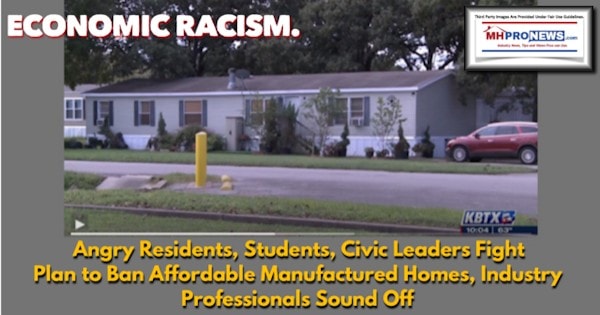
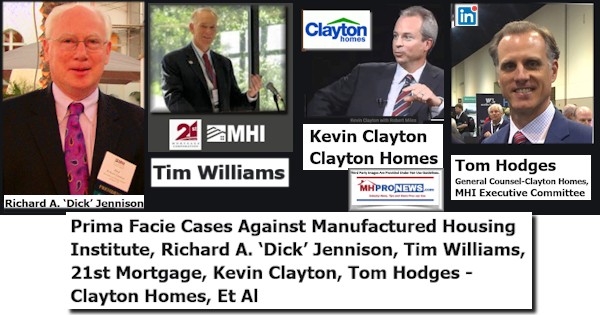

While MHI claims they work for all, several voices inside and outside of MHI have accused the trade group of de facto working for consolidators of the industry by thwarting robust growth. That claim is arguably supported by the fact that MHI has failed to weigh in on this controversy some 2 days after their leaders and outsider attorneys were notified by MHLivingNews/MHProNews. Furthermore, a prior message several days ago to an MHI affiliate in North Carolina has also gone without response. Put differently, they are apparently deliberately not engaging. This, as will be shown below, belies their claims that they are working for racial equity or the interests of potentially millions of households like Tyrone and Jaime Taft.
With that track record and historic backdrop of MHI and HUD’s failure to consistently and persistently act to enforce the laws that could benefit the Taft’s, Plant-A-Home, and others like them coast-to-coast, the following.
| from: | L. A. Tony Kovach – MHLivingNews/MHProNews |
| to: | “Hodges, Tom” @ Clayton Homes Lesli Gooch @mfghome.org, David Goch at WC-B Law, John Greiner at Graydon Law |
| bcc: | Jen Allen First State (Del) MHA,
Amy Bliss at Wisconsin Housing Alliance Rob Ripperda @texas MHA, |
| date: | Sep 7, 2021, 1:55 PM |
| subject: | Tom, Brad, Lesli, David, John et al – About Allegations of violations of rights of minority manufactured housing seekers |
Tom, Brad, Lesli, David, John et al – About Allegations of violations of rights of minority manufactured housing seekers
As you may recall, MHI CEO Lesli Gooch did a recent op-ed that advocated on behalf of making more manufactured homes available to minorities as part of the Biden plans for racial equity in housing.
Q1) If MHI is sincere about the above, then will MHI weigh in directly with Ayden and HUD in order to secure their rights that the Manufactured Housing Improvement Act of 2000, AFFH, and/or other laws and public policies should entitle the Taft’s to obtain their HUD Code manufactured home?
As Brad from NC-MHA.org can tell you, MHProNews contacted him several days ago about the issues reported in the local media shown below regarding the Taft family.
Local informed sources in NC have told MHProNews that as of early this week, no one at MHI nor NC-MHA.org has contacted them in Ayden. Related, please see the forward further below sent to local officials earlier today, which has also been shared with the Taft family and local media, among others.
Related and timely topics follow. As you know, MHI recently sent out an email which in federal law involves using “the wires” to encourage prospective members to join MHI.
Again, if MHI is sincere, then it seems self-evident that it can, should and must weigh in on specific cases such as the one with the Taft family. Clearly, that manufactured home would be provided by a seller. It could pave the way for numerous other manufactured home sales in scenarios like Ayden and that faced by the Taft’s. On the other hand, if MHI does not weigh in directly in a public manner on the Ayden/Taft family controversy, it seems like prima facie evidence that MHI is posturing working for all segments of the industry, while in fact the working to consolidate the industry into ever fewer hands.
There are plenty of issues that MHI could be engaged in that would demonstrate its sincerity in pursuing efforts to support authentic growth in manufactured housing by fulfilling your stated/claimed goals to members and prospective members. Some of those are illustrated in what follows.
Please advise what, if anything, MHI will be doing to address this issue of racial equity that could – if properly addressed – help that family and many others. Tackling enhanced preemption and making it a reality would obviously also benefit manufactured home sellers of all sizes.
Note that MHEC/MHI state affiliates, attorneys, and others are in the BCC to document this request for MHI to act in accordance with its own stated claims.
Thank you. See the forward and attached below.
==== forward and attached to Ayden officials, others ====
Mayor Tripp, Commissioners Mewborn, Goff, Langley, Davis, and Ross,
Part I.
Has anyone advised you that Ayden may be in violation of various federal laws that could put any federal funding in jeopardy as well as risk other possible legal consequences?
The issue in question is relative to Tyrone and Jaime Taft and your town’s Plant-A-Home program. Some background will be provided in this Part I. Legal issues will be examined in Part II. Then, I will pose some questions for your feedback in Part III. By way of introduction, I’m the managing member for MHProNews.com and MHLivingNews.com, our profession’s leading trade publications.
The controversy involving the Taft’s and your town’s Plant-A-Home program has been brought to my attention through the local reporting, linked below.
For our mutual accuracy in understanding, based upon the reporting above, are the following pull quotes.
The Reflector reported the following on April 6, 2021. “Our job is to reach out and try and make things as good as we can for everyone. We’re trying to elevate everyone for them to achieve their fullest potential,” Ayden Mayor Pro-Tem Ivory Mewborn said. He explained that The Plant-A-Home program came as a vision from God.
That report said: “Over the years, the town [of Ayden] has been committed to improving aesthetics and has secured Community Block Development Grants to do so.”
“It helps people change their lives. It’s not only important for our citizens. It’s important for our town. The so-called American dream, a lot of people can’t afford that dream,” Mewborn said.
“The process has been long and it seems like we kept coming to a dead-end especially when it comes to purchasing land,” Jamie Taft said. “It has always been either too expensive or it is not in an area that we want to raise our family.
“This opportunity could not have come at a better time because we were ready to give up on the whole home-buying process. This project is a great opportunity for us because we can stay in an area we like and as area our children are used to and comfortable with. It also gives us an opportunity to be able to afford a better life for our family.”
“That’s what Ayden is about. Ayden is a family town,” Tripp said.
“What we are doing today says that,” he said. “Words you can speak but actions tell the story.”
Commissioners Cindy Goff and Phyliss Ross also said they were delighted with the program and hopeful for its future.
Ross added, “I think it’s really good for the town. It gives people less fortunate a chance to have homes. It’s really good for our town and the growth.”
There are currently six more vacant lots in the Plant-A-Home program. ##
As wonderful as all that sounded, the August 12th report by Donna Marie Williams at dwilliams@ncweeklies.com in the Reflector told a different outcome.
- Despite a plea from Ayden Mayor Pro-tem Ivory Mewborn, Ayden commissioners failed to approve a rezoning request that would allow for double wide mobile homes under special-use permits.
- Commissioners first discussed amending the town’s zoning ordinance to include double wide — or Class B — manufactured homes at their July meeting. ##
Part II.
With that backdrop, it seems that Ayden officials may not be aware of how specific federal law applies in such matters?
If there is a sincere desire to provide an affordable housing opportunity to Tyrone and Jaime Taft or others that may follow, there is legislation already in place under federal law and deals specifically with issues such as the one in your town.
In 2000, Congress passed by a widely bipartisan margin the Manufactured Housing Improvement Act (MHIA), which was signed into law by then President William “Bill” Clinton.
The MHIA includes a provision that has come to be known as “enhanced preemption.” HUD Code manufactured homes preempt local zoning, as the following attached document from Congressional lawmakers details.
Explaining a key provision of that law is the following related quotation by Mark Weiss, J.D., President and CEO of the Manufactured Housing Association for Regulatory Reform (MHARR).
While their approaches are different, the Manufactured Housing Institute has also taken a similar public position.
Additionally, the first administrator for the HUD Office of Manufactured Housing Programs (OMHP), Bill Matchneer, J.D., has weighed in on this topic. See that quotation below.
But perhaps as or more important are these statements from some of the Democratic lawmakers that weighed in with then HUD Secretary Mel Martinez. Note that the letter attached ends with the phrasing that is shown below. It is the same phrasing that MHARR CEO Weiss, J.D., used. Weiss was part of the team that drafted the language of the law.
Summing up the logic of this Part II segment up, your town – per federal law – does not have the ability to lawfully block the placement of a HUD Code manufactured home.
Additionally, while I’m not providing legal advice, there are some other federal laws that may apply. Among those could be the potential loss of federal funding when such a placement is improperly blocked. There may be other civil rights, fair housing, AFFH, and other issues involved too.
I’m sure you are aware that the Biden Administration has claimed that they desire to see more housing provided to blacks and other minorities. I trust that you will pass this information on to Taft family? It sounds like they could use some good news.
As additional insight, you may find the following of interest. From time to time, cities, counties, and towns attempt to block the placement of a HUD Code manufactured home, perhaps in a similar fashion as your town has seemingly done. While my duties and time demands keep me from contacting every such instance, I have on occasion reached out to local officials and provided such information. There are examples of local jurisdictions, in the light of this understanding of federal law, reversing their prior decision to attempt to block the placement of a HUD Code manufactured home.
I’m copying Mr. Weiss, in case you want to reach out to him with any questions. He has been on vacation, and today is Rosh, but he should be back in the office later this week. While I do not speak for MHARR, it would not surprise me if he would confirm what I’ve outlined, as we’ve quoted him and others accurately and provided the relevant documentation.
On a political level. Sometimes local officials act based upon fear of neighboring residents backlash against the placement of a manufactured home. You should be aware that there is ample research that manufactured homes have been specifically studied by the federal government in settings where conventional site built housing has existed. Some of that research occurred during the President Barack Obama, VP Joseph “Joe” Biden Administration and is linked here. The short version of the 150+ page, from your perspective is this. In several studies in various cities in different parts of the U.S., conventional housing and manufactured homes appreciated side-by-side. There was no negative impact on housing values.
More recently, the FHFA has conducted and published research in 2018 that supports the point that manufactured homes placed on privately owned land, as opposed to a land-lease community, also appreciates. The Urban Institute and others reported on those findings.
Prior HUD Secretary Ben Carson promoted the use of manufactured homes and publicly opposed local barriers to such housing placements on several occasions.
While in a litigious society you can no doubt find opposing views, the language of the law seems clear. Again, please see the attached letter from House Democrats to then HUD Secretary Mel Martinez.
Part III. – Question to City Officials, Please Reply On or Off the Record
Q1) Based upon the insights shared herein, will you advise the Taft family of their rights under federal law, including the Manufactured Housing Improvement Act’s “enhanced preemption” clause? (You are welcome to forward this message to them and/or others). Please type your reply below this question and the next. There are no word limits.
Q2) MHProNews/MHLivingNews are hereby requesting a copy of the PowerPoint presented in the hearing reported at the link here. Please hit reply and provide that document. Any other hearing or related meeting documents are welcome, should you for any reason decide not to honor the applicable federal laws in question.
Q3) Finally, based upon the insights you have now been informed of herein, will you now permit the placement of a HUD Code manufactured home in your town for the Taft family and others? If not, why not?
Again, no word limits in your replies. We prefer emailed responses so that there is absolute accuracy in our reporting and no questions about who said what on the record.
Kindly confirm this message. I’m copying the local reporter that covered the story. We look forward to your response.
Respectfully,
Tony … ##
Additional Information, More MHLivingNews Analysis and Commentary
Ironically, MHI’s own website routinely betrays what is increasingly obvious. Namely, that MHI uses nice words, but they fail to match those words with deeds. The reasons why they follow this pattern is apparently to benefit a few dominating brands that benefit from the status quo.
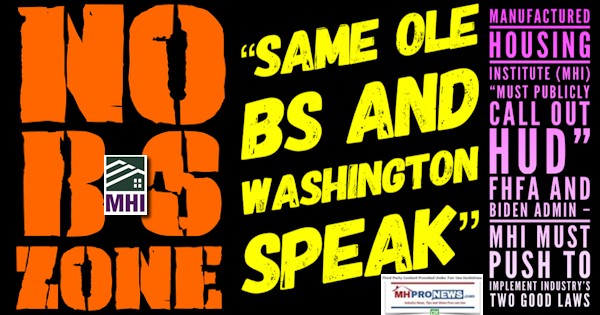
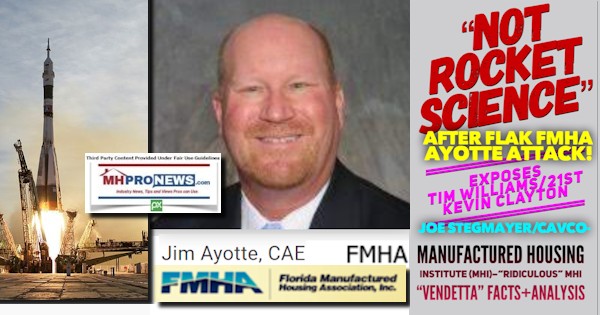



Among the attachments to the above was the following quote from then HUD Secretary Ben Carson.

In fairness, Dr. Carson is not an attorney. Nor was his life-experience prior to HUD focused on affordable housing or manufactured homes. There is no know evidence that Dr. Carson was informed by MHI about enhanced preemption in any of their face to face encounters. Letters to then HUD Secretary Carson by MHARR or MHI were not responded to, which calls into question if Dr. Carson even knows about “enhanced preemption.” That said, in contrast, Brian Montgomery is known to be knowledgeable about all of these issues, and like HUD Secretary Fudge, has failed to act on behalf of manufactured home use by making “enhanced preemption” for potential manufactured home owners and affordable housing seekers a reality.

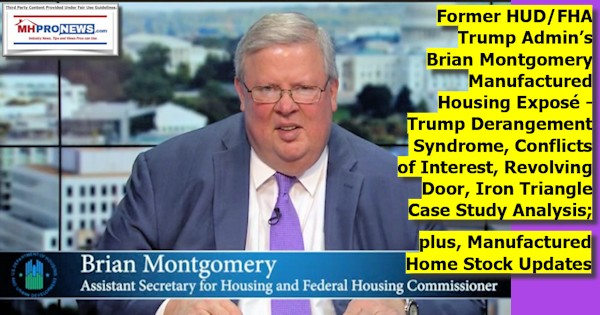
Summing Up, Conclusions and Possible Next Steps
MHLivingNews opened this report by saying that “Words may sound good but are at times proven to be devoid of meaningfully matching action.”
The Rev. Donald Tye Jr. aptly noted that affordable manufactured housing seekers need advocates willing to work tirelessly on behalf of people like the Taft’s and the Plant-A-Home project, or other similar efforts elsewhere in the U.S.
As the co-founder of MHLivingNews, Soheyla Kovach has aptly said, nothing is changed until it is challenged.
Our pro-white-hat professionals and pro-consumer trade media can provide the supportive reporting and documentation that is needed to confront these issues. We as trade media can document how apparently phony behavior that claims to support opportunities for all but then fails to deliver occurs, be it at HUD, MHI, or wherever.
But at the end of the day, it is individuals who should turn to public officials and to local media to demand action. Until change is demanded, the status quo will continue. Local, regional or national media may not be able to do reports of this length, but they are welcomed to quote from this report and others and link to it, so that others can dig into the details and take action.
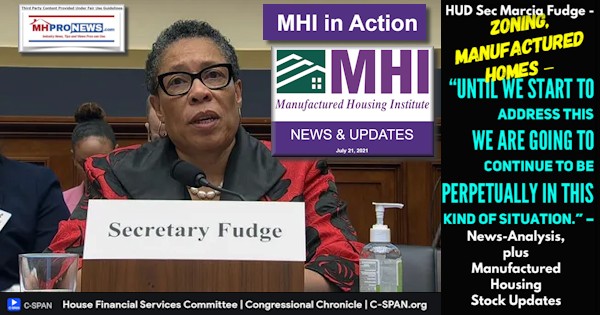
Ironically, it is HUD Secretary Fudge who has said that without action, this pattern – the status quo that benefits a few while harming millions – won’t change. Until these issues are confronted, more of the same is what is what is to be expected. Samuel Strommen from Knudson Law has documented that this pattern apparently violates several federal laws. If and when people demand state and federal officials to investigate and prosecute these purported lawbreakers, such as the leaders and companies named by Strommen at MHI, more of the same will sadly keep on occurring.

The time to act is always now. As Mewborn put it. “Now is the right time do what is right. Working together works.” ##

Seeking solutions? See the letter to a mainstream editor linked below. 500 word executive summary.








We lay out the facts and insights that others are too lazy, agenda-driven, or otherwise uninformed to do. That’s what makes our sister site and this location the runaway leaders for authentic information about affordable housing in general, the politics behind the problems, and manufactured homes specifically. That’s a wrap on this installment of “News through the lens of manufactured homes and factory-built housing” © where “We Provide, You Decide.” © ## (Affordable housing, manufactured homes, reports, fact-checks, analysis, and commentary. Third-party images or content are provided under fair use guidelines for media.) (See Related Reports, further below. Text/image boxes often are hot-linked to other reports that can be access by clicking on them.)

By L.A. “Tony” Kovach – for MHLivingNews.com.
Tony earned a journalism scholarship and earned numerous awards in history and in manufactured housing. For example, he earned the prestigious Lottinville Award in history from the University of Oklahoma, where he studied history and business management. He’s a managing member and co-founder of LifeStyle Factory Homes, LLC, the parent company to MHProNews, and MHLivingNews.com. This article reflects the LLC’s and/or the writer’s position, and may or may not reflect the views of sponsors or supporters.
Connect on LinkedIn: http://www.linkedin.com/in/latonykovach
Recent and Related Reports:
The text/image boxes below are linked to other reports, which can be accessed by clicking on them.


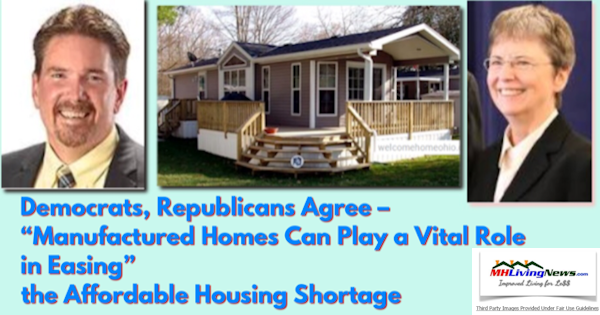
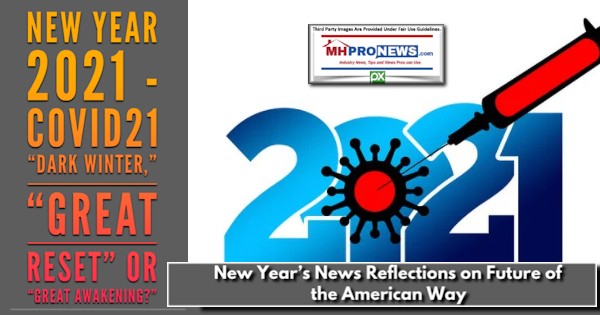
 manufacturedhomelivingnews.com Manufactured Home Living News
manufacturedhomelivingnews.com Manufactured Home Living News










